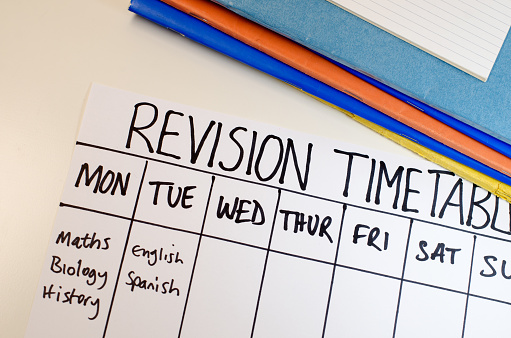
So much to revise and so little time. We’ve all been there. Whether you’ve fallen behind on revision due to chronic procrastination or something totally out of your control, it’s fine. You’ve got this. Here are five top tips to help you complete your revision in time for exams.
Read how to get an A* in A-Level Biology
1. Don’t panic
It’s natural to feel the need to panic when you realise you’re no longer on track with your revision. Everyone else seems to be and there’s that one kid in your class who seems to know everything about everything.
When you feel your heart sinking and the frustration rising, stop and take a moment to calm down. There is absolutely no point in panicking, it will only make you feel worse and stop you from focusing on your studies. It’s now more important than ever to keep your cool – revising with a level head will allow you to focus and absorb what you’re reading.
Please don’t compare yourself to others and get into a fluster – everyone learns at different speeds. Dedicate your energy instead to catching up with your own work.
Read 5 Tips to Make the Perfect Revision Notes>>
2. ‘A fear faced is a fear defeated’
Look at the contents page of your textbooks and make a note of the topics you feel least comfortable with. You might feel like avoiding these topics and revising them last but actually these are the ones you should start with.
They might seem scary now but once you dive in and break the topic down you’ll begin to understand it. This will even help you gain confidence as the topics worrying you most are now out of the way.
Read 3 Steps to Getting 3 A*s at A-Level>>
3. Read exam papers and their mark schemes
Past papers are effective revision tools and are good for checking if you’ve really understood the subject. Ideally, you’d do all the papers in exam conditions then mark your work.
However, if you don’t have enough time for that, try reading all the past paper questions with their mark schemes simultaneously. You’ll be able to see the questions that come up frequently so be sure to memorise their answers.
For maths questions take note of the steps shown in the mark scheme so you know how to lay out your answer to maximise on your method marks.
You can also look through exam papers to find questions on topics you don’t understand. Practice these questions instead of the paper as a whole for some intensified and targeted revision.
Read 4 Ways to Use A-Level Past Papers>>
4. Study smart
Pick the best resources to study from depending on how much time you have left before the exam. If there’s only a few days left but lots of work to do, use revision guides and videos rather than textbooks or making your own notes from scratch.
Finding diagrams and tables from the internet and annotating them is a speedy way of making easy to read notes.
It might feel like you’ve run out of time to revise so use your time efficiently. Have some revision notes on hand while you’re on the bus or waiting for the kettle to boil.
Just be careful and don’t spend every spare minute you have on revision and overload your brain – it’s important to know your limits!
Read 5 Tips to Beat Revision Procrastination>>
5. Don’t wait to ask for help
If you come across something that has you completely stumped don’t be afraid to ask for help. Go to your teacher or a friend and ask them to go through the topic with you.
It’s too close to exams to just ignore what you don’t understand and it’ll save you some precious time if you get someone to help you.
If you’re generally feeling like the stress of exams is becoming too much, speak to someone you trust for some support.
Talking about your worries is often all it takes to make them feel more manageable. Remember, your mental state is just as essential as studying when it comes to doing well in exams.
Words: Ateka Gomaa
